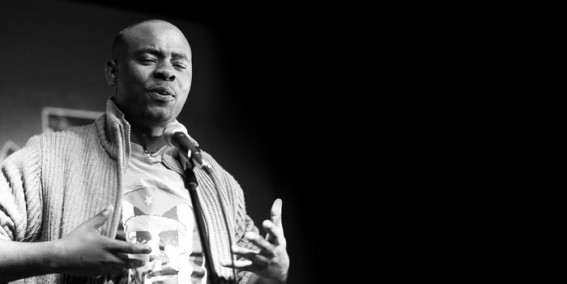
InZync Poetry Sessions, 27 July 2012, Amazink Eatery, Kayamandi
RIAAN OPPELT
In the middle of the iciest winter the country has experienced in many a year, SLiP returned to its home turf at AmaZink on Friday, 27 July with a honed, excellent-to-the-core event that will be remembered for the sheer quality of its participants as well as the completely entrancing presence of DJ Eazy to keep the house busy anytime the poets weren't on the stage. The distinctive element revolved around Jamala Safari, who had chosen the event as one of the sites for a series of book launches of his debut, The Great Agony and Pure Laughter of the Gods. It made for a very different, very unforgettable evening.
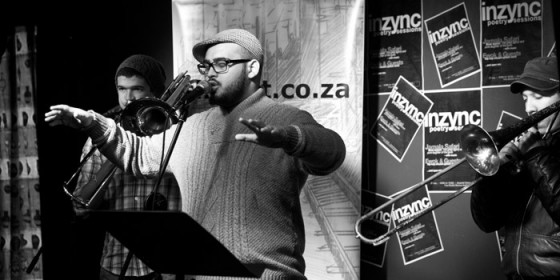
Adrian Different
A bearded Adrian Different, looking as if he’d have been as at home with the Black Panthers in the late 1960s as he does when he’s rapping, opened proceedings with a trademark freestyle. He then welcomed guests and participants like Toni Stuart and DJ Eazy before asking trombone players Michael and Rick to join him for a performance. Our host was in a decidedly old-school state of mind as he delivered a fiery piece all the while backed by the trombones, their blares punctuating his missives at a government unable to deliver text books to schools in need. This was straight 1970s-style musical messaging at work, the turning tones of Adrian’s piece and its brass bodyguards a reminder of some of the proto-hip hop sounds that would inform Run DMC and Public Enemy in the 1980s and, later, the Wu-Tang Clan in the 1990s. Sure, twelve years ago this kind of sound also made a sticky, short-lived comeback with Pharoahe Monch’s Simon Says but a recording of Adrian’s performance with Michael and Rick should go a long way on the radio if put on air right now. It is necessary; it is urgent.
Our writer of the moment, Jamala Safari, then took the stage with two very young guitar players, Jonathan and Jess, emphasising what he feels is the importance of young people finding ways of artistic expression, which is very much the case with most of his book. Backed by the teenage axe-men, Jamala gave us a piece from the book that took in generational ceding of nationhood and social experience, focussing on the path of a young boy finding a way through epoch, episode and shifts that both trouble and motivate his journey. His next piece, “Touch This Bead”, continued the viewpoint from a child’s perspective, and the syncopated voices of the two guitars drew Jamala’s words into their tapestry. In fact, Jamala was so impressed by the young men on the stage that he insisted on stepping down and leaving the two of them to entertain the crowd for two items.
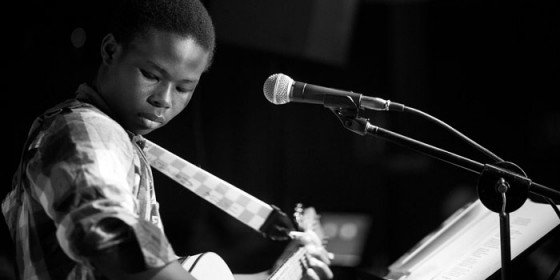
Jonathan
Rhythm guitarist Jonathan revealed himself to be a smooth frontman-in-the-making as the duo performed a cover of Ben Harper’s Burn One Down, Jonathan’s vocal interpretation of Harper’s unique stylings betraying his youth but pointing out positively the trajectory of his confidence. The next song they performed, Lonely, featured Jess holding his breath and going for a guitar solo that built in assurance with each completed phrase; there was nothing too cocksure, nothing too eager-to-please. It just stayed nicely in its box and you could see all the guitar players in the room (experienced pros as well as flash novices) looking closely at Jess’s pentatonic shapes. Well done there, lad.
Jamala returned to the stage after that and enthusiastically paid tribute to the boys, once again underscoring how his artistic focus locates especially the teenage years as fertile for the kind of meditations that form later in the adult mind. The protagonist of much of his book is a 15-year old boy living through the Congo’s tribulations and fragmentations while the rest of the world forgot it existed. On that note, he performed his key piece, one that we remember from the Africa Day SLiP event: “Tam-tam sings”, although this time he did it without the drum accompaniment, almost as if he wanted the words to stand on their own feet. Graceful and charming, Jamala kept his book launch -set short and simple, and our appreciation of his friendship came in a hefty applause when he left the stage.
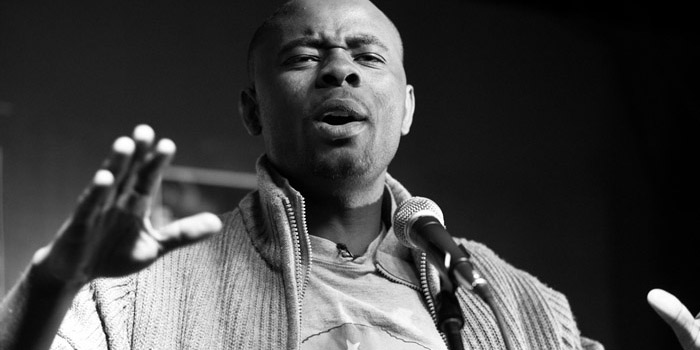
Jamala Safari
Our host, who’d first experienced Jamala’s poetry four years earlier at a competition, expressed his and our gratitude to Jamala for launching his book with us. Very briefly, Adrian announced that the Open Mic would start, plugged the venue’s boerewors and potato wedges special for the night and told us that e-tv cameras were present, along with an imperative of “so don’t look!”

Djembe Riddim Poetry
Another friend from the Africa Day event followed and started off the Open Mic with his group Djembe Riddim Poetry (DRP), although they were in a slightly different incarnation to the DRP that appeared at the Africa Day event. Like his friend Jamala, Mwila, also from the Congo, maintains a thematic concentration on young Africans and this was once again evident. The djembe drum that is so crucial to DRP’s poetry was occupied by a young German woman on this occasion, showing us what Mwila meant when he announced that a prerogative of DRP was to “promote” African culture to the West. This “promotion” featured a message of solidarity to young Africans with a refrain of “don’t blame” and ethereal, trance-inducing chants. The almost double-act of Jamala and DRP should be a consideration for the future: they complement and support one another so well that it’d almost be a pity to see the one without the other.
Kgotso then came along and things got really interesting. In earlier reports, I made observations about Kgotso’s confidence levels during his performances. At the Africa Day event he overcame the bogeys that troubled him at the SliP Slam in May to emerge as a serious and intense hip-hop inspired poet. Strangely, as he did at the Africa Day event, Kgotso again mentioned that he’d been working on his confidence. Now, back in May, such a remark was understandable, but for Kgotso to repeat it this time after he’d already scored such a crucial victory at the Africa Day event (where Adrian said he would be a future main event performer) was intriguing. It hinted at a chasing of excellence in Kgotso’s game and the determination was easy to see in his eyes. Clearly, he remembered his Slam-stumble only too well and did not want to trip up again.
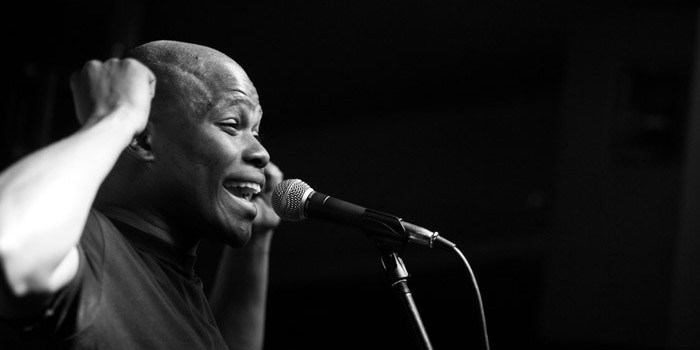
Kgotso
When he started off this time around, it was obvious that he would stumble, going at the hyper speed he did, but the question was more about how he would handle it. The response lay in Kgotso’s budding craftsmanship: already in his first piece, he stumbled because he was going so fast, but he maturely kept it going and injected his verbal athleticism with moral supplements – each time we thought he was about to stop, he merely carried on bigger and better. Toni, who has seen her fair share of performance poets, sat close to the stage and you could tell she was mighty impressed and entertained. Committing to memory so many words and emotions is no small feat, and by the time Kgotso reached his closing line, “genesis forever unknown to us”, he wasn’t the one who needed to catch his breath, it was us!
His next poem addressed unfortunate international perceptions of Africa that were still too uncomfortably couched in 19th century-type ignorance, a point that would resurface later in the evening. Adrian asked Kgotso not to start until an unruly portion of the crowd was quiet, but after about two seconds he simply launched into his performance, quieting them in that way. In a poem abound with crude but effective globalist critiques (including one surprising but stunning mention of “Jim Crowe” laws in the States), as well as global meditations on blackness, Kgotso’ s interests and searching mind were laid bare. His diction needed improvement but give that man a podium (yes, with Bells stashed in it) for yet another display of astounding continuity. On a roll that had many of the Kayamandi poets in the audience going ape-shit, Kgotso suddenly screeched to a halt, appreciating their enthusiasm but admitting, with a shrugged smile, that it was throwing him off. No matter, though, as after a few chug-starts, he was soon back in the stratosphere of verbal speed, shooting off lines I’d never even be able to think, they were so hyper. How the fuck does he remember so much?
This was the second time a SLiP event coincided with the local release of a comic book/superhero film; in this case, The Dark Knight Rises, the third Nolan-directed Batman flick. I mention this because the coincidence is ironic: there they are, these movies that cost hundreds of millions, make billions at the box-office and generally succeed in lifting our spirits to inspire us to see that heroism lies in all of us – blah-blah, cue swelling music and roundhouse kicks. Yet, at no cost whatsoever, we are in contact with poets who produce and incubate a different, more real and more vital heroism that can’t be forgotten by the next day. The lingering feeling after watching a movie like The Dark Knight Rises goes away by the time you get to the junk food, but the thing with the kind of poetry we see at the SLiP events is that it digs a hole in us and takes root there. For that alone, a performer like Kgotso should be flying around with a cape and a big-ass “S” on his chest. Not to burst any Marvel or Detective Comics’ fan bubbles, but it’s unlikely that there’ll be too many grown-ups in tights with utility belts going about; it would also be disturbing and deranged, and we have enough such types in embryo at the Arts Faculty. However, at a poetry event one or two months down the line there may already be a new Kgotso, even as Kgotso is still out to be the new Kgotso. That’s how quickly this growth occurs – although not nearly as fast as Kgotso’s words.
After Kgotso left the stage, Adrian gleefully acknowledged the afterglow we were left in by proudly proclaiming, “die Kaap kan ga’t slap!” indicating that here, at the SLiP events, there was something special, something heroic. With valour also comes daring and, sometimes, effrontery, so Adrian’s next announcement shouldn’t have come as a surprise: he plugged the impending “Zapiro” event, at which he, Pieter, Leon and a host of other poets would support the cartoonist and satirist Jonathan “Zapiro” Shapiro with pieces that largely speak to the wit and tone of Zapiro’s blistering cartoon commentaries, usually aimed at the government. If ever there was an exciting “coming attractions” moment, this was it. Fuck Batman, vote Zapman.
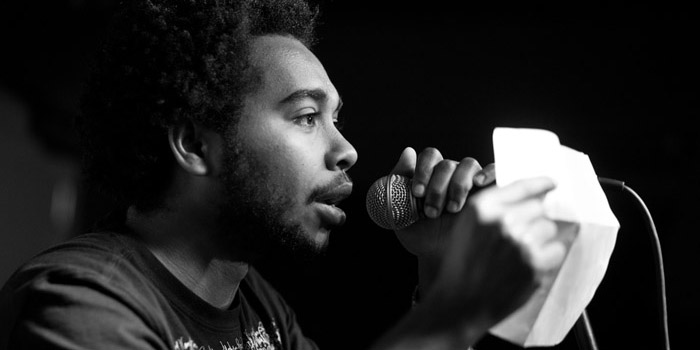
Manny
The next poet to take the stage was Manny from Angola, who received big support from especially the Humanities crowd in the house, including the incomparable SLiP writer Wamuwi Mbao. Sharing with us an eloquent poem about giving meaning back to terms like “revolution” and “peace” in a world of smart phones and social networking, Manny’s SLiP debut was a decent one, and possibly he should’ve done more than one poem to have made it more special.
Next up was Lwandile. To steal from The Sound of Music, how do you solve a problem like Lwandile? The fellow clearly has presence and an uncanny ability to charm and steer an audience, but he is inconsistent. I’ve been noting this since his earliest SLiP performances all the way back in May 2011. In April, after not having appeared at SLiP since the first Slam in October 2011, his coming back was lively, effective and (there’s that word again) heroic. The wily, slick fox in him contributed to the April event towering above the others for sheer power and magnitude (the night of Desiree Bailey, if you need reminding). That night, he started a chant that he has since used every time he takes the stage as an introduction, an announcement that he is in the house. The chant even followed him to the SLiP slam in May. However, while repeating a chant is one thing, repeating the same poems is another. Poems Lwandile did in April also followed him to the Slam in May, and again this time. Admittedly, after getting the house riffing on his chant, Lwandile tried to fall in with the DJ’s beat and drop one of his known poems to it, but it didn’t quite work out, so it makes one wonder whether he shouldn’t perhaps have tried something completely new instead. Lines like “young, black and broke” and “I’ll let you go off/Like a cell phone in a meeting” are catchy when heard once but are in danger of becoming clichéd if they aren’t given a new edge each time they are repeated, and my concern for Lwandile is that he relies too much on the energy from the crowd (because he is a crowd-pleaser) but doesn’t yet show enough willingness to change his game around. If he does that, I think he’d be formidable.
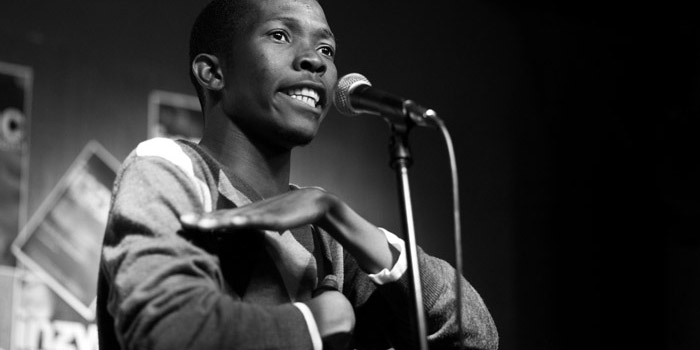
Lwandile
So, with poems we’d already heard before not quite working, Lwandile went into a low-key but thoughtful poem that was initially marred by his affecting an American accent, but fortunately he ditched that in time before it distracted from the poem, which dealt with personal resistance to stereotyping and appropriating metaphors of rising and falling, of defying “otherness” and claiming personal space. The poem was good enough but Lwandile’s delivery suffered, as he was forgetting lines in places and at other times being overly emotive when underplaying his lines would’ve been more effective, because he has a necessarily minimal-stylistic range that can allow for that. He laboured and tripped up the ending of the poem as well and could perhaps try some more variation in his method. I genuinely like Lwandile and have been following his performances for over a year, so I’m not having a go at him: I want for him to up his game and do better. Once his workmanship is sorted out it will gel perfectly with his already established presence and his performances could set buildings alight.
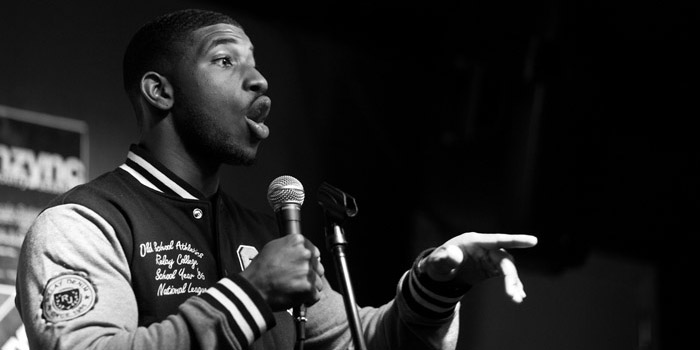
Shai
After Lwandile came Shai, all the way from Virginia. Enthusiastic and moved, he immediately paid tribute to Jamala and the other poets and acknowledged his first South African experience and how it made him pay more attention to a nation’s approach to peace, love and hope. He informed us that he is a recording artist back home and proceeded to perform one of his own tracks, Heavenly Things. There was a nice touch of philosophical layering to his words, oscillating between religious thoughts and personal pontificating. More interesting, however, was his cheeky reference to Arrested Development’s 1993 hit “Tennessee” midway through. You could see he was a settled performer with some experience, and it would’ve been even better if we could have heard some of his tracks. Immediately, the crowd took to him. His next piece was a Big Kris track called Small as a Giant and to help him out with it, he called Jonathan to the stage. A little way into the piece, Jonathan started the edgy guitar riff and at that moment Shai very skilfully brought the crowd into the music. That capped off a very successful SLiP debut and hopefully Shai will still be around for the next one.
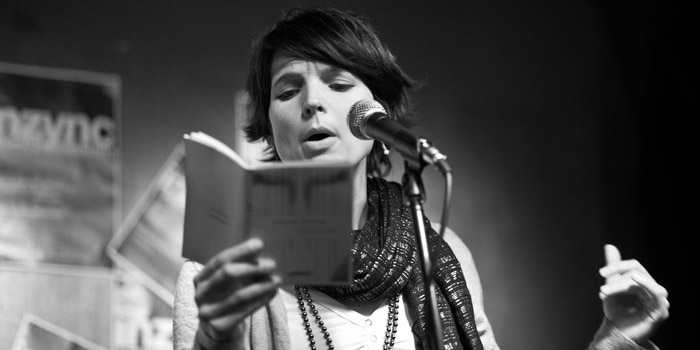
Erin
Erin was next, speaking with an American accent and claiming to have come from Cape Town. She did a love poem with an interesting blend of jagged rhythm, staccato lilts at the end of her lines and a wowing sense of intimacy that made certain bits almost too hot to handle. Add to that her great continuity and you have another SLiP first-timer in the books. She was followed by Clinton, the e-tv cameraman who enjoyed the other poets so much that he could not resist joining the party, a great example of the kind of energy we encourage at the SLiP events. Of course, an e-tv person was bound to get the crowd making all sorts of e-tv announcements as he took the stage, but it was all in good spirit. Clinton brought an unrehearsed Jess to the stage with him and had him play a random chord progression on a slightly out-of-tune guitar (that’s spontaneity for you). Typical of his generation, Clinton’s poem was a struggle-era memory piece livened up by a certain panache I associate with Western Cape coloured people, and the guitar chords somehow worked with him, or he worked with the chords. He kept it short and earned love from the house.
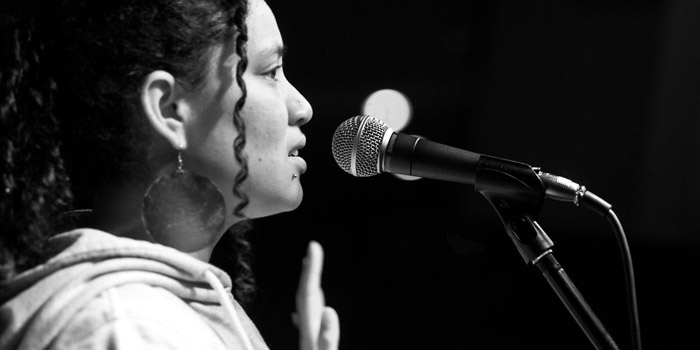
Toni
Adrian then came to announce that the Open Mic was about to end and there would be a short break before the next item, but not before he coerced Toni to take the stage, and it was a sound move: when you have a poetry queen like Toni present, you get her to the stage. When she took the mic, she explained that her doing a poem was unexpected but a good-natured trade-off, as she wanted to plug a national poetry competition (Toni’s community interaction portfolio reads like a book) that was due to close on Monday. Naturally, for the plug, Adrian was always going to get her to do a poem and we are grateful to our shrewd host because, simply put, Toni Stuart is one of the most exquisite, sage and benevolent poets walking the land right now. She gave us “What Love Allows” in that inimitable tone of hers. Her very countenance sings lyrics and when she delivers a poem, it feels like a slow breeze both warm and cool floating around your shoulders before making explorer’s steps on your neck and tickling your fingertips. She is right up there, and her dedication to getting involved anywhere she can with teaching and sharing is something that most politicians can’t get right even if they die and come back as missionaries.
After the break, Adrian was very proud to introduce Creamy Ewok Baggends, someone Adrian described as a mentor figure to him, so you knew something big was coming if our host was so excited. Hailing from Durban (and we find this out the night before the Sharks kicked the Stormers out of Super Rugby, ugh), former Slam champion, former SPITMUNKY frontman, covered in a cap and baggy top and sounding like Eminem-meets-a-Matie, Ewok wasted no time ripping into his first piece, “Take It Back”, his quasi-American accent, arguably, just right for the kind of loaded, dynamite word-stringing he was pulling off. Immediately, one could sense this was a performer of staggering proportions and it was also easy to see why he had an influence on Adrian’s artistry.

Ewok
His second piece was a humorous, razor-sharp take on smart phones, a wonderful dissecting of how de-personalised we have become through our reliance on devices that are increasingly becoming a proxy for meaningful human engagement. He had us laughing and absorbed, because we saw so much of ourselves in his material, and with his grizzled, quasi-Eminem voice he commanded proceedings. If this had to have been a Slam, he would’ve won with this poem alone.
His next piece, “And So?”, was equally brilliant, focussing on the mixture of the imperative and the banal present in most conversations, when a typically South African (read: anywhere in the world, really) male response to social, historical or political subject matter in conversations is “and so?” These are massive topics to cram into poems but he was deft and superb, hardly breaking a sweat and enjoying himself. When Brendan, the superlative sound operator, asked Ewok for a “hot signal” on the beat box, you had the performer affect a mock-tentative approach to the beat box, regarding it as a dangerous animal lying suspiciously dormant, before he dropped the act, tried a few beat-box variations and sent a signal that was looped to great delight around the house. Possibly, Brendan wanted to test the equipment in anticipation of the later part of Ewok’s set and the response showed that the equipment, and the artist, were in solid nick. Ewok then dedicated a more measured, more rhetorical piece to Adrian, called “Pimp My Poetry”, both an assertion of the socio-trajectory of his own schemes and the younger fire of our always-up-for-it host.
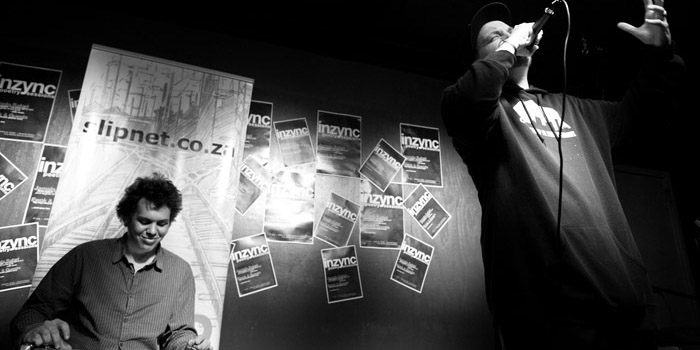
Ewok and Charles
It was then time for one member of his part-time collaborators to join him so that two-thirds of French jazz collective, Blue Gene, was on stage. Blue Gene features the French musicians Charles and Dario, combining their immaculate instrumentalism and technical nous with Ewok’s wordplay. Charles appeared with a lap-slide guitar, and again you had the guitarists in the house standing up to get a better look: a lap-slide at Amazink? Amazing. You could tell many in the house had never seen one before, let alone heard one and in Charles’ capable hands the instrument provided tones and licks worthy of the great Ry Cooder himself while Ewok offered a mesmerising freestyle over it. They continued this fervent energy into the next piece, “Two Empty Shoes” and, even with all of Ewok’s off-the-cuff asides, the flow of the piece never felt interrupted because Charles’ lap-slide work was holding it all together. After that, Charles then took a harmonica and the other Blue Gene member, Dario, came onstage to provide and control loops, in tandem with Brendan’s supervision from his station. The soundscape was almost out of a parallel universe over the next two pieces: Dario held a tape recorder to the mic as Ewok rhymed and Charles hit the lap-slide again on the piece, “The Strength of Us”. Ewok then directed the crowd into a chant of “What do you fight for when you fight?” while looping his own beat-dropping which Charles’ slide guitar, well, slid over. After a final, powerful piece once again dedicated to Adrian (“Dif”, as Ewok calls him), Ewok and Blue Gene said their thanks and left the stage. DJ Eazy then picked up where he left off and had the crowd on their feet within seconds, the first time I actually saw a crowd stay for a while after the poetry had ended.
I doubt we’ve had this kind of sound-scaping before at a SLiP event and if you take the super-cool flow of Ewok’s set, a perfect blend of raw, verbal supremacy and nominal musicianship, the might of Kgotso, the radiance of Toni and you remember the vibe the DJ was in charge of in-between the poetry performances, you have another great comeback for a SLiP event at Amazink after a minor lay-off during the winter break. In Ewok we experienced one of our all-time greatest main eventers, alongside Desiree Bailey and Blaq Pearl and I, for one, remain completely blown away by the SLiP team’s supernatural knack to keep pulling such class acts.
 SLiPStellenbosch Literary Project
SLiPStellenbosch Literary Project